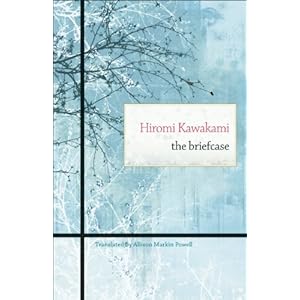
It's great to see a couple more titles by Kawakami Hiromi appearing in translation in the not so distant future, Parade, a companion piece to Strange Weather in Tokyo is due in November by Soft Skull Press, translated by Allison Markin Powell and then next year Breasts and Eggs, which was awarded the Akutagawa Prize is due to be published by Picador, at the moment I see the translation is listed as being from both David Boyd and Sam Bett. Recently published in the U.K by Granta is The Ten Loves of Mr Nishino, translated by Allison Markin Powell, it feels simply mind boggling that nine years have passed since first reading Manazuru and thanks mainly to Allison Markin Powell we've read more in the time between.
Reading The Ten Loves of Mr Nishino the structure of the book brought to mind Revenge by Ogawa Yoko, as in some ways reading the chapters it feels like that they could be read as individual short stories that make up the whole novel, perhaps with Revenge the book is more thematically arranged and here it's more concentrated on character. That said, as much as the central character is the rather enigmatic Nishino-san, womaniser or socially awkward?, there's the balance that the book is equally presenting ten chapters exploring the lives of the ten women who fall in and out of love with him. The prose in The Ten Loves of Mr Nishino is more straight forward story telling as compared to Hebi wo fumu . Over the ten chapters, there's a connection between a couple here, as well as being given portraits into the lives of the women, we take in the life of Nishino Yukihiko, it feels that we get snapshots of his life as the relationships with the ten women occur over various points of his life, and indeed slightly beyond. An aspect due for contemplation is in as much as the narrative tells us a little about Nishino, thinking about what we don't know is of equal interest.
Perhaps a striking element of the book is the amount of sex to it, not a massive amount maybe by other standards, but unsurprisingly it's central to most of the relationships which somehow is an interesting comparison to make with media reports that Japan is becoming increasingly sexless, or has issues with sex, perhaps this is mere media hyperbole, and maybe the book appeared before this recent social observation took hold, or came into fashion.
Through out the prose feels pitch perfect, there are moments of harshness and softness from character to character, it's not until perhaps the chapter Grapes that Nishino comes under the harsher criticism, and in the previous chapter Marimo, Kawakami finishes of the chapter with a poignant scene of dimming sunlight and the encounter with Nishino coming to an end for Sayuri Sasaki, who it feels is caught in a loveless marriage and perhaps in a single statement after meeting Nishino at an Energy Saving Cooking Club sums up the slightly pitiable Nishino - 'I forgave Nishino his past, I forgave Nishino his present and I forgave Nishino his eternal future'.
Read the first chapter Parfait at Granta
The Ten Loves of Mr Nishino at Granta Books


